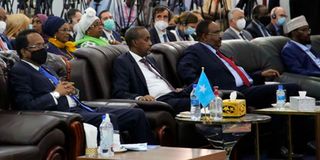Somalis are right to be angered by Farmaajo’s ‘khat-fish’ Ethiopia deal

Somalia’s President Mohamed Abdullahi Farmaajo (left) and Prime Minister Mohamed Hussein Roble (centre) at the National Election Advisory Summit in Mogadishu on May 27, attended by foreign diplomats and state officials.
What you need to know:
- Somalis have sharply criticised their president for entering into trade pacts that are not beneficial to the country.
- Somalia banned Kenya’s miraa (khat) in March, ostensively as part of Covid-19 pandemic containment measures.
Somalia President Mohamed Abdullahi Farmaajo’s last days in office are full of goofs. From his futile attempt at illegally extending his term, which lapsed in February, to failed schemes to sabotage the upcoming elections, Farmaajo has egg all over his face. To add insult to injury, he is making diplomatic decisions and entering into bilateral agreements that make Somalia a laughing stock of other countries.
One such deal is a lopsided bilateral agreement with Addis Ababa to swap fish for khat. Under the agreement sanctioned by Farmaajo this month that was touted to enhance trade relations between the Horn of Africa neighbours, Somalia will export fish to Ethiopia in exchange for khat.
Somalis have sharply criticised their president for entering into trade pacts that are not beneficial to the country. Angry citizens took to social media and other public forums to express their disappointment with the deal, which they likened to the exploitative and draconian colonial barter trade system.
Farmaajo is accused of using khat as a diplomatic bargaining chip to advance his vested interests. He is said to be keen on monopolising and personalising khat trade as some of his family members are leading khat traders in Mogadishu. Besides, the deal comes at a time when, desperate to defend his seat in the forthcoming elections, Farmaajo is obviously fundraising for a campaign war chest.
The highly classified pact has not clearly spelt out direct financial or other benefits to the Somali people. This is detrimental to the economy of Somalis, bearing in mind that the Farmaajo administration controversially granted fishing licences to more than 50 Chinese vessels to exploit tuna and tuna-like species off the Somali coast. China Overseas Fisheries Association is set to reap big from the deal by exporting fish to Ethiopia and wiring proceeds to China at the expense of Somalis.
Critics say Farmaajo should, instead, have built local infrastructure to exploit marine resources for the local and foreign market so as to raise the much-needed funds for rebuilding Somalia. It is also ironic for Somalia to flirt with the Chinese yet they have been accused of engaging in unfair fishing practices that resulted in depleted fish stocks in their areas of operation.
Banned Kenya’s miraa
Another school of thought opines that Somalia needs the fish more than Ethiopia does due to its widespread starvation and malnutrition. Latest statistics show more than a million children under five are malnourished in Somalia with almost a similar number of expectant and nursing women in need of emergency nutritional assistance.
Additionally, questions linger concerning the rationale of Mogadishu to allow khat imports from Ethiopia yet it locked out the stimulant from Kenya. Somalia banned Kenya’s miraa (khat) in March, ostensively as part of Covid-19 pandemic containment measures.
Despite the recent move by the two neighbours to normalise diplomatic relations and announcing resumption of flights to enhance bilateral trade, khat supplies from Nairobi haves not resumed to Mogadishu.
It is such double standards and double-speak from the Farmaajo regime that have incensed Somalis who consider Kenyan khat, particularly that produced in Meru County, to be of higher quality compared to Ethiopia’s, considered by users as inferior.
Somalia’s khat-for-fish trade-off with Ethiopia can be likened to Britain’s colonial opium trade with India that impoverished the Asian country. Under the 19th Century trade agreement, the British colonial government forced Indian peasant farmers to cultivate poppy plants for export to the United Kingdom in exchange for insignificant gains like food. As part of the collateral damage, the poor Indians got hooked to drugs, affecting their health and general productivity.
Essentially, Mogadishu ought to sign trade agreements that are beneficial to Somalis lest they boomerang on the leaders responsible. Somalis are waiting with bated breath for the Farmaajo regime to fully resume trade relations with Kenya, which were more beneficial to their economy than any other.
Mr Kwinga is a political scientist. [email protected].





